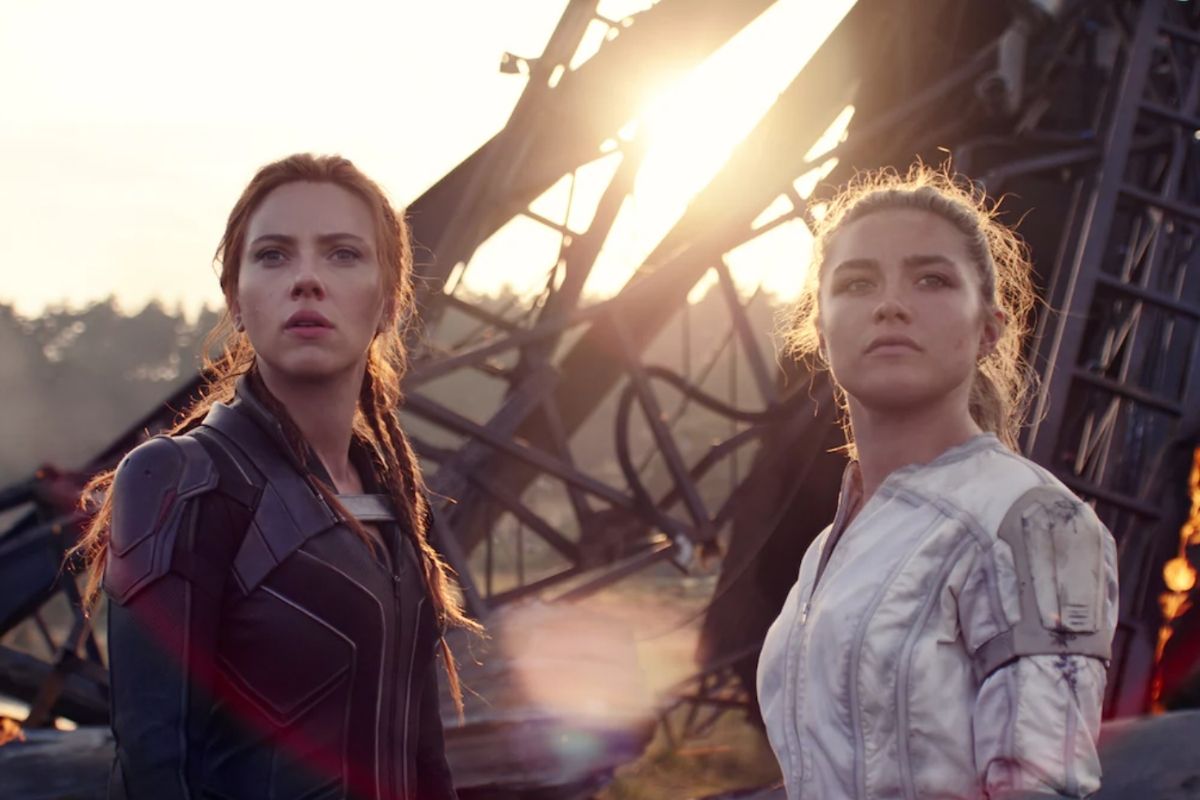REVIEW: Black Widow Is a High-Octane Spy Thriller and a Satisfying Capper to Scarlett Johansson’s Tenure in the Marvel Cinematic Universe
4/5 Florence Pughs.

It’s been 11 years since Scarlett Johansson made her MCU debut as Natasha Romanoff in Iron Man 2. And while many of her male co-workers spent the intervening years starring in their own trilogies, fans have been clamoring for a standalone Black Widow feature. Johansson was even beaten to the punch by Brie Larson’s Captain Marvel, who was the first female Marvel character to have her own film. Black Widow, however, benefits from a decade’s worth of character evolution to offer a thrilling, unexpected sendoff to Johansson’s tenure in the Marvel cinematic universe.
The film opens in Ohio in 1995, where young Natasha (Ever Anderson) is a blue-haired preteen living a normal suburban existence with her little sister Yelena (Violet McGraw), her mother Melina (Rachel Weisz), and her father Alexei (David Harbour). But their idyllic family life is a lie: Melina is a Russian spy and Alexei is Red Guardian, Russia’s own super soldier modeled after Captain America. These two Russian operatives are undercover as your average American family (much like the terrific FX series The Americans), complete with two daughters that aren’t their own. The end of the mission means the end of this family unit, as the family makes a hasty escape to Cuba, where both daughters are quickly sent to the Red Room to begin their Black Widow training.
It’s a thrilling, emotional opening that instantly explains Natasha’s devotion to the makeshift family that is the Avengers. It also explains why the team’s fracture affects her so deeply.
The film flashes forward to 2016, where it finds Natasha in the immediate aftermath of Captain America: Civil War, on the run as an international fugitive. The Avengers have splintered off, so Natasha hides away in a Norwegian wilderness outpost with a new identity, some cold beers, and James Bond’s Moonraker playing on a tiny television.
But her hideout isn’t a secret for long, as she’s attacked by Taskmaster, a brutally efficient weaponized soldier with the ability to mimic their opponent’s fighting styles. But Taskmaster wasn’t after Natasha, but a mysterious package sent to her by her estranged sister Yelena Belova (Florence Pugh).
The film’s action sequences are gritty and intense, favoring hand to hand combat over weaponry (although there is plenty of gunfire and explosions to be had). Cate Shortland’s (The Berlin Syndrome) direction ensures that every punch lands with a bone-cracking thud, ably reminding us that Natasha is one of the few Avengers without super strength or Godlike powers or a flying suit. “I doubt the god from space has to take an Ibuprofen after a fight,” Yelena quips after a particularly brutal fight.
The two finally cross paths: both survivors of the Red Room, both lethal assassins trying to find their place in the world. But while Natasha broke free from her programming, Yelena is new to operating outside the influence of the Red Room. The two easily create a familiar sibling rivalry, complete with teasing and banter, that feels lived in and authentic. This is largely thanks to the performance of Florence Pugh (Midsommar, Little Women) who nearly steals the film from Johansson.
Pugh’s pugnacious, snarky little sister is a welcome foil to the cool reserve of Johansson. Where Natasha is controlled and tactical, Yelena wears her emotions on her sleeve. As the two team up to take down the Red Room and its villainous leader General Dreykov (Ray Winstone), they are forced to have an ad-hoc family reunion with their estranged parents. This involves breaking Alexei out of a Siberian prison and finding Melina experimenting on hogs in the Russian countryside.
Shortland balances the high-energy spy thriller with a dysfunctional family drama, effortlessly establishing these characters and the scars they carry from a lifetime of espionage. David Harbour offers welcome comic relief as an aging, out of shape super soldier clinging to his glory days. The only character that feels underserved is Weisz’s Melina, who I wish the film spent more time with.
At nearly 2 and a half hours, Black Widow drags in some parts (as most Marvel movies do). But it accomplishes a whole lot of world building and gravity-defying action sequences that could rival the Mission: Impossible series. It also focuses on a collection of highly capable, strong women who struggle to undo the damage (both physical and emotional) they’ve suffered at the hands of cruel men in power. Black Widow has a welcome feminist worldview that sees the women of the Romanoff family dominating nearly every scene. Harbour’s Alexei remains on awe of his family, as are we.
Many wondered if Natasha’s self-sacrifice in Avengers: Endgame would distract from Black Widow’s solo film. But Shortland artfully provides context and depth for Natasha’s choices in the ensuing films that only serve to make Natasha’s arc richer and more fulfilling while setting the stage for Yelena to carry on her legacy. It’s an effective, emotional capper to Natasha Romanoff’s journey and a testament to Scarlett Johansson’s decade of work.
(image: Marvel Studios)
Want more stories like this? Become a subscriber and support the site!
—The Mary Sue has a strict comment policy that forbids, but is not limited to, personal insults toward anyone, hate speech, and trolling.—
Have a tip we should know? tips@themarysue.com